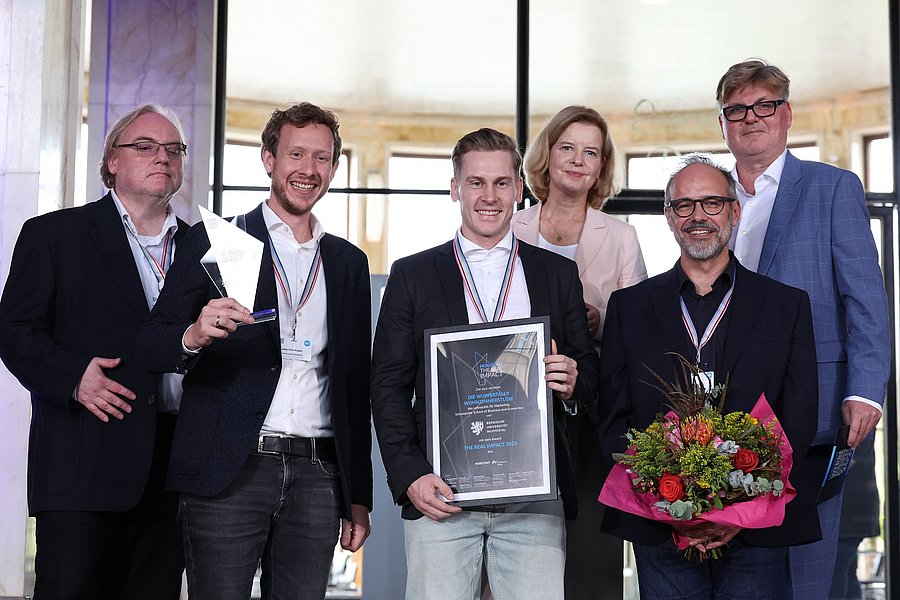Distinction
How can advertising succeed in the digital age? - Wuppertal living room study wins important industry prize

The winning trio from the University of Wuppertal (front from left): Julian Felix Kopka, Lennart Borgmann and Tobias Langner impressed the jury with their "Wuppertal Living Room Study". // Photo Thomas Fedra
"The award is a special recognition of our work - especially because it comes from the ranks of those who are confronted with the great challenges of realising effective marketing communication on a daily basis," emphasises Prof Dr Tobias Langner, who heads the Chair of Marketing at the University of Wuppertal and conducted the study together with his colleagues Lennart Borgmann and Julian Felix Kopka.
The Wuppertal Living Room Study is the largest mobile eye-tracking field study in Germany to date. For it, 144 people were observed in their home environment in order to analyse how they consume media and advertising. The study examines the question of how advertising still attracts attention in an environment characterised by numerous media offerings. The researchers wanted to find out which tactics work particularly effectively in designing adverts to attract and retain attention.
Living room becomes a laboratory
"Attention is the super variable of consumer behaviour and a core competence of our department. Since the smartphone has become our constant companion, we are constantly online, distracted and filtering content at breakneck speed - advertising often gets the short end of the stick. Researching the underlying mechanisms and thus contributing to more effective and efficient advertising has fascinated us from the very beginning," explains Julian Felix Kopka.
The researchers made a virtue out of necessity: when the coronavirus pandemic made traditional laboratory experiments impossible, they visited the test subjects at home and examined their advertising behaviour where it takes place - in their living rooms. They took a close look: What advertising content do the study participants actually perceive and what do they get stuck on? Their test subjects wore glasses that documented their eye movements.
"Our study shows that around half of the attention is explained by pure design elements. An appeal to practitioners is therefore: use attention-grabbing tactics," says Lennart Borgmann. Large ad formats, a direct approach, animated scenes, foreign language elements and unknown people are particularly effective in attracting attention. These results were also clear: Media consumption today can take place anytime and anywhere, the smartphone dominates, traditional media such as TV are losing importance.
Celebrities, influencers, positive emotions, contrasts, beautiful backgrounds and competitions work to keep people's attention. At the same time, it is clear that overly intrusive design, such as bright colours or loud music, can be counterproductive and lead to advertising avoidance.
"Out of the ivory tower"
The interview with the three winners, which is also quoted in this article, was conducted by the Horizon editorial team. The article "Forschung muss raus aus dem Elfenbeinturm" (pdf download) was published in HORIZONT 36-37 from 4 September 2025, page 18-19. Further information on the magazine and editorial team: horizont.net.
Note: Please note that the pdf published here is for viewing purposes only. The rights for editorial use must be purchased separately from the provider.
The theory that everything is new in the digital world and completely changes people's perception is untenable. The basic mechanisms of attention distribution are surprisingly stable - characterised by thousands of years of evolution. In the context of automated short-term observation, for example, our gaze always lingers first on stimuli that stand out from the mass of stimuli. However, the researchers were impressed by the enormous extent of permanent distraction and the associated decline in attention spans. "It is also striking that consumers today are even more active than before in choosing which content they allow to be viewed," says Langner.
"Advertising success is not a product of chance"
In addition to practical recommendations for designing effective advertising, the study also provides reliable insights for advertisers' budget planning as well as theoretical impulses for advertising research. "Advertising success is not a random product of creative inspiration. Rather, it is based on knowledge of the fundamental psychological mechanisms of perception, processing and learning - mechanisms that can be understood and utilised in a targeted manner," explains Langner.
Jury chairman Dirk Engel summarises: "The study impresses with its scientific depth, practical relevance and innovative approach to the topic of advertising attention in digitalised everyday life. The combination of different methods is particularly noteworthy. The proximity to the everyday lives of recipients is a good reality check for advertisers. The study does not remain solely descriptive, but also examines various tactics for generating attention - very instructive for advertising practitioners. What I would particularly like to emphasise: We have here an elaborate study that was not commissioned by an agency or an advertising marketer, but is a purely academic project from which a whole series of scientific publications have emerged."
Advertising Science Symposium at the University of Wuppertal
On 30 October 2025 , the Chair of Marketing, together with the German Advertising Research Association (DWG), is organising the symposium on effective brand communication in Wuppertal with many experts from the field. Information can be found on the DWG website: https://dwg-online.net/events/markenkommunikation/
